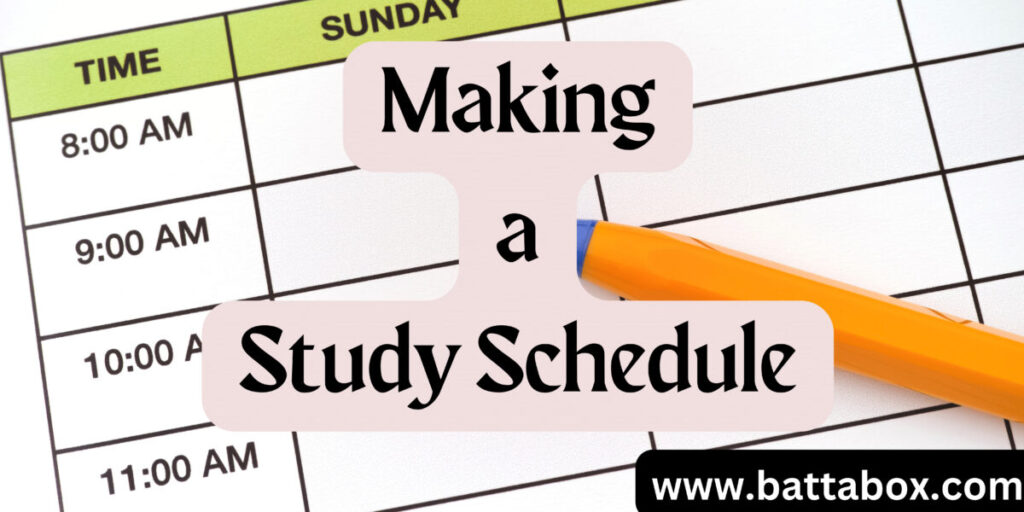Welcome to the world of effective studying! As students, we all know the importance of hitting the books and putting in the hard work in order to achieve academic success. But studying can sometimes be boring and unproductive, and we’re here to change that.

In this article, we’ll be sharing with you some key tips and techniques on how to study effectively, so you can make the most of your study sessions and achieve your goals.
Understanding the Concept of Effective Study
Effective study is the key to unlocking your full potential and achieving academic success. It’s the process of actively engaging with the material, breaking it down into manageable chunks, and using a variety of techniques to solidify your understanding and retention of the information.
It’s not just about sitting down with a textbook and reading it over and over again, it’s about finding the best way to learn for you and making the most of your time and effort.
Effective studying can also include setting specific, measurable goals, creating a study schedule, using active learning techniques, practicing retrieval, taking breaks, managing time effectively, and seeking help when needed.
It’s a holistic approach that can help you to fully understand and internalize the material, making it easier to recall and apply in the future. And the best part is that it’s not a one-size-fits-all, you can experiment and find the best study habits that work for you.
So, let’s start your journey to effective studying and see how it can transform your academic performance!
Importance of Effective Studying in Achieving Academic Success
Effective studying is crucial in achieving academic success for several reasons:
- Improved understanding and retention of the material: By using active learning techniques and practicing retrieval, students are able to fully understand and internalize the material, making it easier to recall and apply in the future.
- Increased motivation and engagement: Setting specific, measurable goals and creating a study schedule can help students stay motivated and engaged in their studies, leading to better performance and academic achievement.
- Enhanced time management: By managing time effectively, students are able to make the most of their study sessions, prioritize their tasks and avoid procrastination which leads to better performance and reduced stress.
- Better performance on exams and assignments: Effective studying can help students to perform better on exams and assignments, as they have a deeper understanding of the material and are able to recall it more easily.
- Better grades: Effective studying leads to better performance, better performance leads to better grades, which can open up more opportunities for academic and professional advancement.
- Better prepared for the future: Effective studying can give students the skills and knowledge they need to succeed in their chosen field or career.
- Improved self-confidence: Achieving academic success through effective studying can improve a student’s self-confidence and help them to build a positive attitude towards learning and education.
By taking an active approach to studying, students can empower themselves with the knowledge and skills they need to succeed academically, and in their future careers.
Steps to Studying Effectively

From setting specific and measurable goals to taking breaks and seeking help when you need it, we’ve got you covered. So, grab a notebook and a pen, and let’s get started on the journey to effective studying!
1. Setting Specific, Measurable Goals
Setting specific, measurable goals is an important step in effective studying. It helps students to stay focused and motivated, and to measure their progress over time.
Importance of Setting Goals towards Studying Effectively
Setting goals is important for several reasons:
- Provides direction and focus: Setting goals helps to provide direction and focus for students. It helps them to understand what they want to achieve and how they plan to achieve it.
- Increases motivation: Having specific goals in place can increase motivation, as it gives students something to work towards and a sense of purpose.
- Helps to measure progress: Setting measurable goals allows students to track their progress, which can help them to understand what is working and what is not, and make adjustments as needed.
- Enhances decision-making: Setting goals helps students to prioritize their actions and make better decisions about how to use their time and resources.
- Improves self-confidence: Achieving goals can improve self-confidence, as it helps students to understand their own abilities and potential.
- Helps to overcome procrastination: Setting goals can help students to overcome procrastination, as it gives them a sense of direction and motivation to start working on a task.
- Helps to prepare for the future: Setting goals can help students to prepare for the future, as it gives them a sense of direction and helps them to understand what they want to achieve in the long term.
Setting goals can help students to stay focused, motivated, and on track towards achieving their academic and personal aspirations.
READ ALSO:
5 common practices only Nigerians will understand(Opens in a new browser tab)
Record 100 Scrabble Players To Storm Lekki On Independence Day(Opens in a new browser tab)
Nigerian man who was rejected by 7 scholarships bags award to study in the UK
How to Set Specific, Measurable Goals

Here are a few steps to help you set specific, measurable goals:
- Define the Goal
Clearly and specifically define what you want to achieve. Be as specific as possible. For example, instead of “I want to study more,” set a goal to “I want to study for two hours every day.”
- Make it Measurable
Break your goal down into smaller, measurable parts. For example, instead of “I want to improve my grades,” set a goal to “I want to raise my grade in math from a C to a B.”
- Set a Deadline
Give yourself a deadline to achieve your goal. For example, “I want to raise my grade in math from a C to a B by the end of the semester.”
- Be Realistic
Be realistic about what you can achieve and the resources you have available. For example, instead of “I want to memorize all the math formulas,” set a goal to “I want to memorize the most commonly used math formulas.”
- Create an Action Plan
Break down your goal into smaller, actionable steps. For example, if your goal is to “study for two hours every day,” you can create an action plan that includes steps such as “find a quiet place to study,” “create a study schedule,” “set a timer for two hours,” and “remove distractions.”
- Review and Adjust
Regularly review your goals and progress, and make adjustments as needed. This will help you to stay on track and make sure that you are still moving towards your goal.
- Make them SMART
Specific, Measurable, Achievable, Relevant and Time-bound. This helps to ensure that the goals are clear, specific, and attainable.
By following these steps, you can create specific, measurable goals that will help you to stay focused and motivated, and achieve your academic and personal aspirations. Remember that setting goals is an ongoing process and you should revisit and adjust them as you progress through your studies.
Examples of Effective Goals
Here are a few examples of effective goals for students:
- “I want to study for two hours every day”
- “I want to raise my grade in math from a C to a B by the end of the semester”
- “I want to read one chapter of my history textbook every day”
- “I want to memorize the most commonly used math formulas by next week”
- “I want to improve my test-taking skills by taking at least one practice test every week”
- “I want to write a 1000-word essay every week”
- “I want to improve my public speaking skills by joining a debate club”
- “I want to increase my vocabulary by learning 10 new words every day”
- “I want to improve my writing skills by getting feedback from my teacher once a month”
- “I want to improve my time management skills by creating a daily schedule and sticking to it”
As you can see, these goals are specific, measurable, achievable, and have a deadline. They are also actionable, meaning that students can take specific steps to achieve them.
Remember, it’s important to make your goals specific to you and your current academic level. Also, it’s important to make sure the goals are relevant to your current academic and personal aspirations.
2. Making a Study Schedule

Creating a study schedule is an important step in effective studying. It helps students to make the most of their time and to stay on track with their goals.
Importance of Having a Schedule
Having a study schedule is important for several reasons:
- Helps to manage time effectively: Having a schedule in place helps students to manage their time more effectively, by providing structure and focus to their study sessions.
- Increases productivity: Having a schedule in place can increase productivity, as students know exactly when and how they will be studying and can make the most of their time.
- Helps to prioritize tasks: A schedule can help students to prioritize their tasks, by outlining which tasks are most important and need to be done first.
- Reduces stress: Having a schedule in place can reduce stress, as students know when and how they will be studying, and are less likely to feel overwhelmed.
- Improves performance: Having a schedule in place can improve performance, as students are able to make the most of their time and stay focused on their goals.
- Helps to achieve goals: Having a schedule in place can help students to achieve their goals, by providing structure and focus to their study sessions.
- Improved self-discipline: Having a schedule in place can help students to develop self-discipline, as they learn to stick to a schedule and manage their time effectively.
Having a schedule in place can help students to manage their time more effectively, increase productivity, reduce stress and improve performance, which can help them to achieve their academic goals.
How to Create a Study Schedule
Here are a few steps to help you create an effective study schedule:
- Assess your current schedule: Take a look at your current schedule and assess how much time you have available for studying. Consider your classes, extracurricular activities, work, and other commitments.
- Identify your goals: Identify your academic goals and determine how much time you need to dedicate to each subject or task.
- Be realistic: Be realistic about how much time you can realistically dedicate to studying each day or week.
- Block out study time: Block out specific times in your schedule for studying. Make sure to include both short-term and long-term deadlines, and adjust accordingly.
- Use a calendar or planner: Use a calendar or planner to schedule your study sessions. This will help you to stay organized and on track with your goals.
- Use time-blocking technique: Break your study time into chunks, for example, 25 minutes of studying and 5-minute break. This technique is called the Pomodoro technique.
- Schedule breaks: Schedule regular breaks throughout your study sessions, so that you can rest your mind and recharge your batteries.
- Stick to your schedule: Once you have created your study schedule, stick to it as much as possible. This will help you to make the most of your time and to stay on track with your goals.
- Review and adjust: Review your schedule periodically and adjust as needed to ensure that it is still effective for you.
Remember, creating a study schedule is an ongoing process and you should revisit and adjust it as you progress through your studies.
It’s important to find a schedule that works for you, so don’t be afraid to experiment and make adjustments as needed. And don’t forget to include time for self-care and leisure activities to avoid burnout.
Tips for Sticking to a Schedule
Here are a few tips to help you stick to your study schedule:
- Make it a habit: Set aside a specific time every day for studying, and make it a habit. This will help you to establish a routine and make it easier to stick to your schedule.
- Prioritize your tasks: Prioritize your tasks based on their importance and upcoming deadlines. This will help you to stay focused and motivated.
- Remove distractions: Remove distractions from your study environment, such as your phone, social media, and other electronic devices.
- Use a timer: Use a timer to keep track of your study sessions, and stick to the time you’ve allocated for each task.
- Reward yourself: Reward yourself for sticking to your schedule, such as taking a break, watching your favorite show or playing a video game.
- Be flexible: Be prepared to adjust your schedule as needed, but try to stick to it as much as possible.
- Get an accountability partner: Get a friend or family member to hold you accountable for sticking to your schedule.
- Keep your schedule in a visible place: Keep your schedule in a visible place, such as on your wall, desktop or mobile, so you can easily refer to it.
- Reflect on your progress: Reflect on your progress regularly and make adjustments as needed.
Sticking to a study schedule can be challenging, but it is essential for achieving academic success. By making it a habit, prioritizing tasks, removing distractions, and rewarding yourself, you can help to make it easier to stick to your schedule and achieve your goals.
READ ALSO:
Creative Nigerian student spends N1.2m, builds light truck as final year project
Nigerian student who graduated with third-class in OAU bags first-class degree abroad
3. Using Active Learning Techniques

Active learning is a teaching method that encourages students to engage with the material and take an active role in their own learning. Here are a few examples of active learning techniques that students can use to study effectively:
- Practice retrieval: Practice retrieving information from memory by testing yourself on the material. This can be done through flashcards, quizzes, or self-made questions.
- Summarize: Summarize the material by creating a condensed version of the information, such as a mind map or a summary chart.
- Teach someone else: Teach the material to someone else, such as a friend or family member. This can help to solidify your understanding of the material and help you to identify any areas of confusion.
- Debate: Debate the material with a partner or group. This can help you to understand different perspectives and strengthen your own arguments.
- Create a concept map: Create a concept map to show how different ideas or concepts in the material are related.
- Use mnemonic device: Use mnemonic devices to help you remember important information, such as creating an acronym or a rhyme.
- Use images and diagrams: Use images and diagrams to help you understand and remember the material.
- Practice problem-solving: Practice solving problems related to the material, this can help you to understand how the material can be applied in the real world.
Active learning techniques can help students to better understand and remember the material and to take an active role in their own learning. Experiment with different techniques and find the ones that work best for you.
How to Incorporate Active Learning into Your Study Routine
Here are a few steps to help you incorporate active learning into your study routine:
- Assess your current study routine: Take a look at your current study routine and assess how much time you spend actively engaging with the material.
- Identify areas for improvement: Identify areas where you could benefit from incorporating active learning techniques, such as areas where you struggle to remember information or understand concepts.
- Choose active learning techniques that work for you: Research different active learning techniques and choose the ones that work best for you and the material you are studying.
- Incorporate active learning into your schedule: Incorporate active learning techniques into your study schedule by setting aside specific times to engage with the material in an active way.
- Make it a habit: Make active learning a habit by incorporating it into your regular study routine.
- Reflect on your progress: Reflect on your progress regularly and make adjustments as needed.
- Mix it up: try different active learning techniques and switch them up regularly to keep your study sessions interesting and engaging.
- Get feedback: Get feedback from your teacher or study partner about the effectiveness of the active learning techniques you are using and make adjustments as needed.
Active learning techniques can help students to better understand and remember the material and to take an active role in their own learning.
Incorporating active learning techniques into your study routine can help to make your study sessions more engaging and effective. Remember that it’s important to experiment with different techniques, and find the ones that work best for you.
4. Practicing Retrieval

Practicing retrieval is a powerful active learning technique that involves testing yourself on the material in order to retrieve information from memory.
Different Ways to Practice Retrieval
- Create flashcards: Create flashcards with questions or key terms on one side, and the answer or definition on the other. Use these flashcards to test yourself on the material.
- Take practice quizzes: Take practice quizzes or tests on the material. This can help you to identify areas where you need to focus your studying.
- Write your own questions: Write your own questions based on the material, and use them to test yourself.
- Use spaced repetition: Use spaced repetition to help you remember the material. This involves reviewing the material at increasing intervals of time, such as every day, every week, and every month.
- Test yourself in different ways: Test yourself in different ways, such as by writing the answers, saying them out loud, or teaching them to someone else. This can help to solidify your understanding of the material.
- Reflect on your progress: Reflect on your progress regularly and make adjustments as needed.
- Use technology: Use technology such as mobile apps or websites that can help you to practice retrieval, such as Quizlet, Anki or Memrise
Practicing retrieval can help to strengthen your memory and improve your understanding of the material. By creating flashcards, taking practice quizzes, writing your own questions, and using spaced repetition, you can make the most of this powerful active learning technique.
Remember that testing yourself on the material and reflecting on your progress can help you to identify areas where you need to focus your studying.
How to Use Retrieval Practice to Identify Areas of Weakness
Retrieval practice is an effective method of identifying areas of weakness in your understanding of the material. Here are a few steps to help you use retrieval practice to identify areas of weakness:
- Assess your current understanding: Before beginning retrieval practice, assess your current understanding of the material. This will help you to establish a baseline for your progress.
- Create flashcards or practice quizzes: Create flashcards or practice quizzes that cover the material you are studying. Use these to test yourself on the material.
- Reflect on your progress: Reflect on your progress as you complete the flashcards or practice quizzes. Take note of any areas where you struggle to retrieve the information or where you make mistakes.
- Identify patterns of weakness: Identify patterns of weakness by looking at the areas where you struggle to retrieve the information or where you make mistakes.
- Focus your studying: Use the information you have gathered to focus your studying on the areas where you struggle or make mistakes.
- Re-test yourself: After some time, re-test yourself on the material, this will help you to see how much you have improved.
- Reflect on your progress: Reflect on your progress regularly and make adjustments as needed.
- Get feedback: Get feedback from your teacher or study partner about the areas where you struggle to retrieve the information, this can help you to identify areas of weakness.
Retrieval practice is an effective method of identifying areas of weakness in your understanding of the material.
By using flashcards or practice quizzes, reflecting on your progress, identifying patterns of weakness, focusing your studying, and getting feedback, you can use retrieval practice to improve your understanding of the material.
Remember that it’s important to be honest with yourself and identify the areas where you struggle, this is the only way to improve.
4. Taking Breaks

Taking breaks is an important part of effective studying. Regular breaks can help you to stay focused and motivated, and can also help to reduce stress. Here are a few tips on how to take breaks effectively:
- Schedule regular breaks: Schedule regular breaks throughout your study sessions. For example, you might take a 5-minute break every 25 minutes of studying.
- Use a timer: Use a timer to keep track of your study sessions and breaks. This will help you to stay on schedule.
- Get up and move: During your breaks, get up and move around. Take a walk, stretch, or do a quick exercise. This can help to refresh your mind and body.
- Engage in a different activity: Engage in a different activity during your breaks, such as listening to music, reading, or playing a game.
- Avoid screens: Avoid screens during your breaks, as they can be stimulating and make it harder to relax.
- Take a nap: A short nap during your break can help to refresh your mind and improve your focus.
- Reflect on your progress: Reflect on your progress during your breaks and make adjustments as needed.
- Be mindful: Be mindful of your thoughts and feelings during your breaks, and take the time to relax and recharge.
Regular breaks are important for maintaining focus and reducing stress. By scheduling regular breaks, using a timer, getting up and moving, engaging in different activities, avoiding screens, taking a nap and being mindful, you can make the most of your breaks and maintain your focus throughout your study sessions.
Examples of Activities to do During Breaks
Here are a few examples of activities you can do during breaks to refresh your mind and body:
- Exercise: Do a quick workout such as jumping jacks, push-ups, or a yoga pose.
- Stretch: Take a break from sitting and engage in some stretching exercises.
- Take a walk: Go outside and take a walk around your neighborhood or campus.
- Listen to music: Put on your headphones and listen to your favorite music, podcast or an audiobook.
- Read: Read a book, magazine or newspaper for a few minutes during your break.
- Meditate or do deep breathing exercises: Take a few minutes to meditate or do some deep breathing exercises.
- Play a game: Play a quick game on your phone or computer.
- Make a snack: Make a healthy snack to eat during your break.
- Get a drink of water: Stay hydrated and drink a glass of water.
- Talk to someone: Call or text a friend or family member to catch up during your break.
The most important thing is to engage in an activity that you enjoy and that can help you relax and recharge. Remember that breaks should be used to refresh your mind and body and not to procrastinate. Experiment with different activities and find the ones that work best for you.
6. Time Management

Time management is the process of planning and organizing how to allocate time effectively and efficiently. Here are a few tips on how to manage your time effectively:
- Prioritize your tasks: Prioritize your tasks based on their importance and upcoming deadlines. This will help you to stay focused and motivated.
- Create a schedule: Create a schedule that includes your classes, extracurricular activities, work, and other commitments. This will help you to see how much time you have available for studying.
- Use a timer: Use a timer to keep track of your study sessions and breaks. This will help you to stay on schedule.
- Eliminate distractions: Eliminate distractions from your study environment, such as your phone, social media, and other electronic devices.
- Break down large tasks: Break down large tasks into smaller, more manageable chunks. This will make it easier to stay on track and to see your progress.
- Be flexible: Be prepared to adjust your schedule as needed, but try to stick to it as much as possible.
- Get an accountability partner: Get a friend or family member to hold you accountable for sticking to your schedule.
- Keep your schedule in a visible place: Keep your schedule in a visible place, such as on your wall, desktop or mobile, so you can easily refer to it.
- Reflect on your progress: Reflect on your progress regularly and make adjustments as needed.
- Learn to say no: Learn to say no to activities or commitments that are not important or that you don’t have time for.
Effective time management is essential for achieving academic success. By prioritizing tasks, creating a schedule, using a timer, eliminating distractions, breaking down large tasks, being flexible, getting an accountability partner and reflecting on your progress, you can manage your time effectively and make the most of your study sessions.
READ ALSO:
International Scholarships for Nigerian Students
Canadian Scholarships for Nigerian Students
Academic Scholarships Programs for International Students
Remember that learning to say no to non-important activities and commitments can also help you to manage your time effectively. Additionally, setting specific and measurable goals can help you to stay focused and motivated.
It’s also important to be mindful of your time and to avoid procrastination, as it can lead to feeling overwhelmed and stressed. Instead, try to focus on one task at a time, and work on it until it’s done before moving on to the next task.
Another helpful tip for time management is to use tools and apps to help you stay organized and on track. For example, you can use a calendar app to schedule your classes, tasks, and deadlines, or a to-do list app to keep track of your tasks and check them off as you complete them.
In summary, time management is a key factor in achieving academic success, it requires planning, organization, focus, and flexibility. It’s essential to prioritize tasks, create a schedule, eliminate distractions, break down big tasks, set goals, be flexible, and use tools and apps to help you stay organized.
Time management is a skill that takes practice to develop and it’s important to reflect on your progress regularly and make adjustments as needed.
How to Avoid Procrastination

Procrastination can be a major obstacle to achieving academic success. Here are a few tips on how to avoid procrastination:
- Identify the root cause: Identify the root cause of your procrastination, it could be fear of failure, lack of motivation, lack of interest in the task, or difficulty in starting a task.
- Break down large tasks: Break down large tasks into smaller, more manageable chunks. This will make it easier to start and see your progress.
- Set specific and measurable goals: Set specific and measurable goals for your tasks, this will give you a clear direction and a sense of accomplishment when you achieve them.
- Use a timer: Use a timer to help you stay on task and focus for a set amount of time.
- Eliminate distractions: Eliminate distractions from your study environment, such as your phone, social media, and other electronic devices.
- Prioritize your tasks: Prioritize your tasks based on their importance and upcoming deadlines. This will help you to stay focused and motivated.
- Get an accountability partner: Get a friend or family member to hold you accountable for sticking to your schedule.
- Reward yourself: Reward yourself for completing tasks, this can help to motivate you to stay on track.
- Be kind to yourself: Be kind to yourself and avoid negative self-talk. Remember that it’s normal to procrastinate sometimes, and it’s important to be patient and compassionate with yourself.
- Use apps or tools: Use apps or tools like Forest or Cold Turkey to help you stay focused and block distracting websites or apps.
Procrastination is a common problem, but it can be overcome with the right mindset, techniques and tools.
By identifying the root cause, breaking down tasks, setting goals, using a timer, eliminating distractions, prioritizing tasks, getting an accountability partner, rewarding yourself, being kind to yourself, and using apps or tools, you can avoid procrastination and achieve academic success.
Remember that time management is a skill that takes practice to develop and it’s important to reflect on your progress regularly and make adjustments as needed.
7. Seeking Help
Seeking help is an important step in achieving academic success. Here are a few tips on how to seek help:
- Identify your needs: Identify the areas where you need help, whether it be in a specific subject, test-taking strategies, time management, or study skills.
- Ask your teacher: Ask your teacher for help during or after class, or make an appointment to see them during their office hours.
- Join a study group: Join a study group with other students in your class. This can be a great way to review the material, ask questions, and get support.
- Visit the tutoring center: Visit the tutoring center on your campus for help with specific subjects.
- Seek online resources: Seek online resources such as Khan Academy, Coursera, or edX for video tutorials and practice quizzes.
- Get a tutor: Get a tutor to help you with specific subjects or test-taking strategies.
- Seek help from a counselor: Seek help from a counselor or therapist if you are struggling with stress, anxiety, or other emotional issues that are affecting your ability to study.
- Be proactive: Be proactive in seeking help, don’t wait until you are struggling to ask for help.
- Be specific: Be specific when asking for help, it will make it easier for the person to understand your needs and provide the right kind of help.
- Seek help early: Seek help early, the sooner you seek help, the more time you’ll have to improve your understanding and the better chance you’ll have of achieving academic success.
It’s important to remember that seeking help is a sign of strength, not weakness. Everyone needs help at some point, and it’s important to be proactive in seeking help when you need it. Be specific when asking for help, seek help early and don’t wait until you are struggling to ask.
Remember that there are many resources available to help you achieve academic success and it’s important to take advantage of them.
Implementing the Outlined Tips for Effective Study

Implementing the outlined tips for studying effectively can help you achieve academic success. It may require some effort and discipline at the beginning, but with time and practice, it will become a natural part of your routine. Here are a few words of encouragement to help you get started:
- Believe in yourself: Believe in yourself and your ability to succeed. You have what it takes to achieve your academic goals.
- Start small: Start small and take one step at a time. You don’t have to change everything at once.
- Be consistent: Consistency is key. Make studying a regular part of your routine, and you will see progress over time.
- Experiment: Experiment with different techniques and strategies until you find what works best for you.
- Be patient: Be patient with yourself. Learning and improving takes time, and it’s important to be kind and compassionate with yourself.
- Stay motivated: Stay motivated by setting specific and measurable goals, and rewarding yourself for reaching them.
- Seek help: Remember that seeking help is a sign of strength, not weakness. There are many resources available to help you achieve academic success.
- Don’t give up: Don’t give up when you encounter challenges or obstacles. Keep going, and remember why you started.
- Stay positive: Stay positive and focus on the progress you have made, not on what you haven’t achieved yet.
- Have fun: Have fun with the process of learning and growing. Enjoy the journey!
Studying effectively can be challenging at times, but it is possible to achieve your academic goals with the right mindset, techniques, and resources.
Remember to believe in yourself, start small, be consistent, experiment, be patient, stay motivated, seek help, don’t give up, stay positive and have fun. With the right mindset, you can be on your way to achieving academic success!





